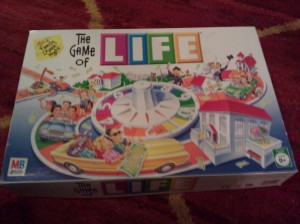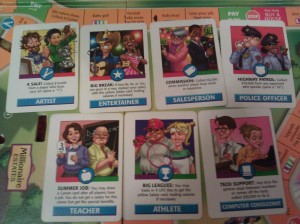Hey everyone! I’m super excited to be involved in Tiltfactor’s NSF Bias project and will be reflecting on how current games have contributed to or influenced the topic we are addressing.
This week, I will be briefly discussing how Milton Bradley’s The Game of Life could potentially impact its players’ career and/or life goals.

The Game of Life is a table-top board game designed for children 9 or older that allows players to live through a compressed version of adulthood — from college to retirement. Along the way, players get to do “adult things” like choose jobs, get married, have children, and buy a home. I would like to specifically address how this game creates a skewed perspective of the potential benefits of going to college.
The game starts out by allowing the player to choose between going to college or directly starting a career. While this is a critical decision people are forced to make in real life, in the game the results of this decision do not influence the game much beyond allowing players to be eligible to be either a doctor or accountant. I am a firm believer in the notion that the mechanic is the message in game design. Mechanically speaking, however, the only benefit of going to college is eligibility for two vague jobs that “require a degree.”

On the other hand, there are seven jobs that do not require a degree.

I believe that this distinction, though presumably meant to encourage children to go to college, actually creates a distorted understanding of what going to college can do for you. In short, it provides children with the misconception that college automatically qualifies them for some vague “upper level” job (in this case, a doctor or accountant) while not going to college makes them fit for more “common” jobs. In my experience, the point of college is not to simply “become” qualified for a high-ranking job, but rather to find something you are passionate about and learn how to contribute to that field to the best of your ability.
While I understand that it is not practical to capture this idea given the rest of the way the game works, I feel that this aspect in particular creates a distorted understanding of people’s reasons for pursuing higher education. For example, being an artist does not require a college degree in this game. What happens to a player who might actually be passionate about the arts or sports? Would they be discouraged from seeking higher education to explore their passion?
I bring this up because game designers need to be aware of the fact that players’ expectations from life could be influenced by the games they played in childhood. While The Game of Life might have been designed with good intentions, it could potentially discourage players from pursuing their passions, considering applying to college, or both. Ultimately, socially responsible game designers should be attentive and work to prevent or undo such potential effects.

